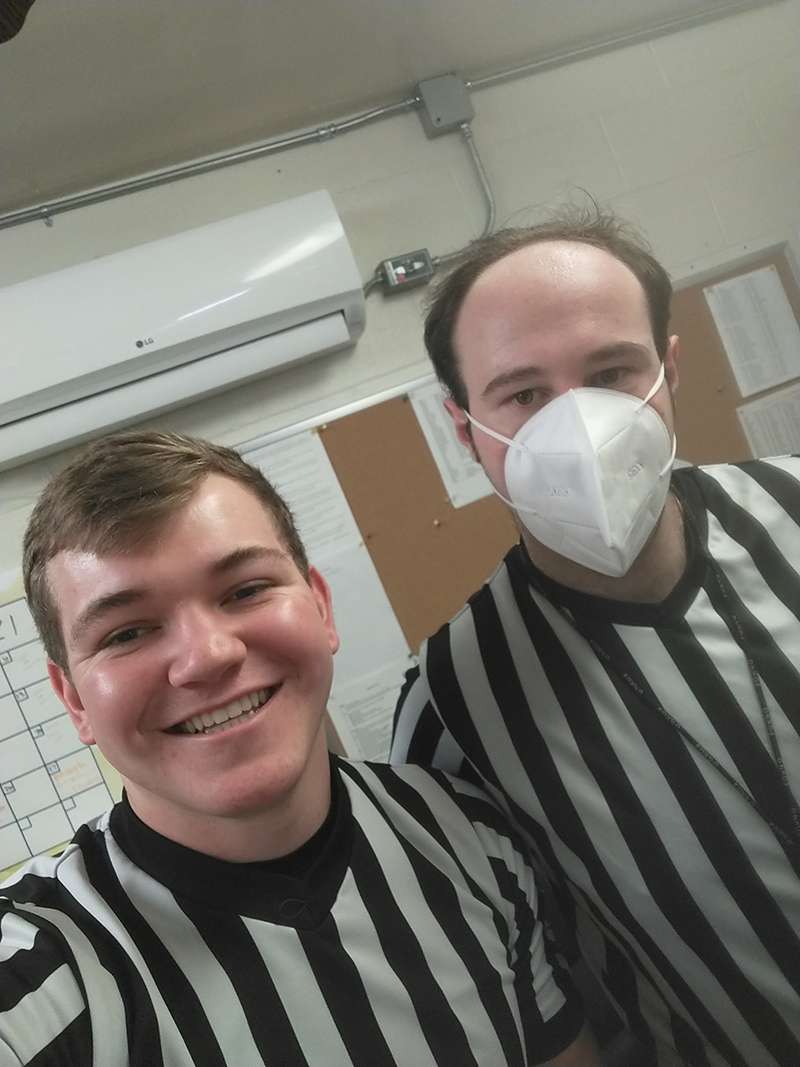
By CRISTINA JANNEY
Hays Post
A Fort Hays State University graduate student is trying to break down barriers and eliminate stigma on and off the court.
Will Fried, who has Asperger's syndrome, a high-functioning form of autism, is living a dream he's had since he was in the fourth grade, being a basketball referee.
Fried, of Bethesda, Md., came to FHSU in the fall to work on a master's degree in higher education and student affairs. He is a member of the FHSU Student Accessibility Services Committee.
His hopes after he finishes his degree is to work full time in disability services, diversity, inclusion or intramurals at the college level.
Fried played basketball through his high school years. He played on a level A amateur team, which was a competitive team with some travel. He attended Coach K's Duke basketball camp as a youth where he said learned heart, strength and grit.
"You have to be enthusiastic about what you want to do and keep going," he said.
He was also a season ticket holder from time he was a kid for the University of Maryland women's basketball team and is still a great fan.
"I've seen competitive games," he said. "I've officiated. I have seen both sides. I understand the situations coming from both sides."
Fried's first had the opportunity to wear the black and white stripes when he was 18 and was selected to be an official at a basketball camp in Frostburg, Md.
He continued refereeing intramurals when he entered college at the University of Maryland, Salisbury. After two years in the program, he was promoted to a supervisor and was in charge of other officials.
He sought to continue refereeing in Hays and has landed assignments to referee rec, middle school and JV basketball games.
When he was asked why he enjoyed refereeing, he said it was the camaraderie.
"I think it is the camaraderie with the other officials and still being able to give back and honor the game in some way," he said. "You enjoy it and still have the pride in [the game]."
As a student, Fried said he has had to become more aware of his own needs and works to overcome barriers. He may have to read an article two or three times to gain a deep understanding of its content.
As someone who has autism, he said he works to try to be aware of how he is interacting with others in his classes and how he is contributing to the discussions in classes.
Fried said he hopes to create more awareness about autism and disabilities through his future career and his involvement in sports.
"People believe that people with disabilities can't do anything, but people [should] be allowed to do whatever they want with their own self determination," he said.
Autism has a range of symptoms, but common symptoms include difficulty with communication and social interactions, obsessive interests, and repetitive behaviors.
Fried said people who have autism have a range of abilities, as well as challenges.
"Each person with a disability is not the same," he said. "Some people might have autism as well, but you can't give them the same treatment you do to someone else because they are a totally different person.
"Different people have different specialties and activities they like to do. It has to be more customized from person to person."
He explained some people who have autism are non-verbal and use communication devices to speak. They also may have sensitives to sound or touch.
"Then you have the highest spectrum for people who are formally known as Asperger's, which are people like myself who are smart, who are very detailed, know what they're doing, but at times can be deemed as socially awkward," he said.
He asked the community to not stereotype individuals who have autism.
"You have to see the whole person as themselves and for the uniqueness they bring to society," he said.
Fried said he is seeing awareness of disabilities grow in sports. Last year, Kent State awarded the first Division I basketball scholarship to a person who has autism, Kalin Bennett.
A high school basketball manger who also has autism, Jason "J-Mac" McElwain scored 20 points in a game his senior year in high school. He is now a marathon runner and public speaker.
People who have disabilities need to have mentors to help them be better athletes and officials, Fried said. He said he seeks mentors to watch his games and give him feedback so he can improve his officiating.
"I think people have seen my officiating and how much heart, strength, grit and passion I bring to the kids and the coaches with the knowledge of the game," he said. ... "It definitely has inspired other people to work harder and break down things."
Fried said he wants to help others strive for greatness. He is already mentoring two other people who hope to be disability advocates.
Fried said he is following the lead of disability activist Ed Roberts, who was the first student who relied on a wheelchair to attend the University of California, Berkeley.
"Go out and change the old attitudes," Fried quoted Roberts. "Bring other people with disabilities around with you. Help them strive for greatness too. We need to be all in this together, and we can do great things."






